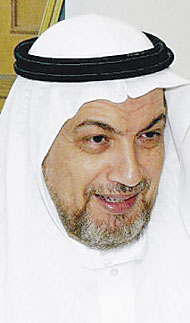JEDDAH, 9 August 2006 — Turkey’s highest court, the Council of State, has overturned a government order that resulted in the freezing of assets of Saudi businessman and philanthropist Yassin Al-Qadi.
According to a statement by Al-Qadi’s London-based solicitors, Carter-Ruck, an order was issued freezing the Saudi’s assets five years ago after the United Nations, at the behest of the United States, designated him as a suspected Al-Qaeda financier.
In its judgment the Council of State found that no evidence had been presented linking Al-Qadi with Al-Qaeda and said that the Turkish government had acted unconstitutionally and that the order needed to be overturned. The court also ruled that in relation to the supposed allegations Al-Qadi had never been charged or indicted by a court of law anywhere in the world including the US.
“The case was with the Turkish court for over three years. They researched and reviewed and investigated everything and thank God for this decision that was issued a few days ago,” Al-Qadi said to Arab News.
Turkish prosecutors undertook a detailed investigation into Al-Qadi in December 2004 and reported that there were no grounds to initiate any form of legal or criminal action against him. In addition to this, Al-Qadi received the backing of Turkish Prime Minister Recep Tayyip Erdogan, who publicly announced that he personally knew Al-Qadi and he was certain that Al-Qadi had no links whatsoever with any terrorist organization.
Al-Qadi’s assets were frozen by the US and the UN shortly after the attacks on the twin towers in New York and an investigation was started in October 2001.
The Saudi businessman headed the charity Muwafaq Foundation, which appeared on a CIA list of suspected Al-Qaeda front organizations and has since stopped operating.
In 1997 the charity received funds from the UN for its famine-relief work in the Sudan.
The US allegations said that Al-Qadi gave money in 1998 ostensibly to construct student housing at the Al-Iman University in Yemen while knowing that the funds could potentially be diverted to financing Al-Qaeda’s attacks on New York.
“The charges are ridiculous and unfounded allegations,” Al-Qadi told Arab News at the time. Since his name was put on the CIA list the Saudi businessman has been pursuing all possible means and measures to bring an end to the case saying it would have a negative effect on his life and activities. He has filed cases in all the countries where his assets had been frozen. “The problem is the US pressure on the UN in freezing assets,” he said.
The current UN asset freezing regime is considered flawed by many observers who are calling for the introduction of a regime that will ensure that designated individuals be provided with full details of the case against them and an opportunity to defend themselves before a proper independent tribunal.
Al-Qadi is pursuing his demands for such an open and transparent system in a test case that is presently pending before the European Court of Justice. “Until such an improved system is in place, the sanctions regime is vulnerable to abuse of the kind that presently exists, whereby innocent persons such as Mr. Al-Qadi remains on the list indefinitely for purely political reasons notwithstanding the absence of compelling evidence against them,” said Al-Qadi’s British solicitors Carter-Ruck.
The Saudi government has also taken up Al-Qadi’s case and made clear its belief in his innocence and has formally requested that his name be removed from the list of those persons whose assets are frozen by the UN.
“The most important thing now after the Saudi government has formally requested the lifting of my name from the list is to get that done and then all the charges and cases overturned,” said Al-Qadi.


